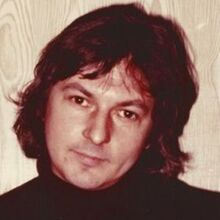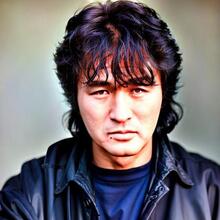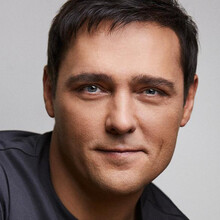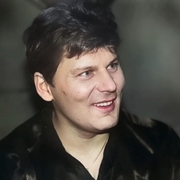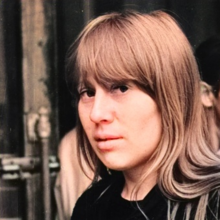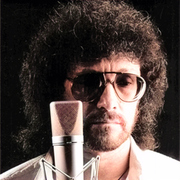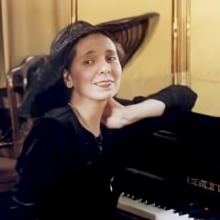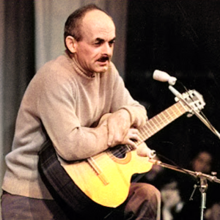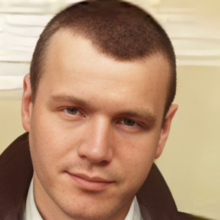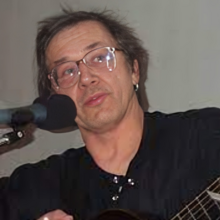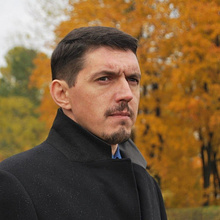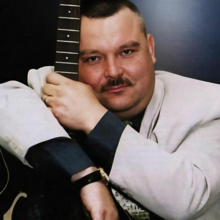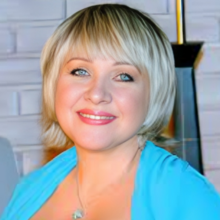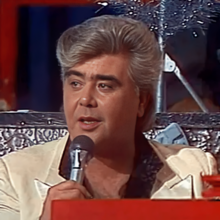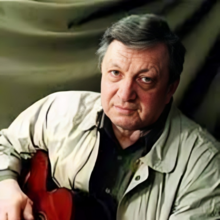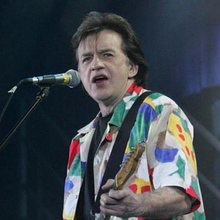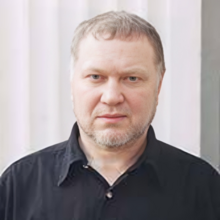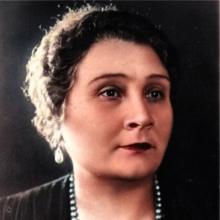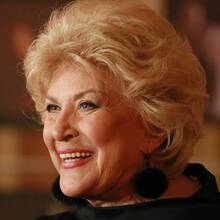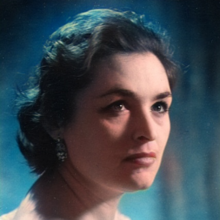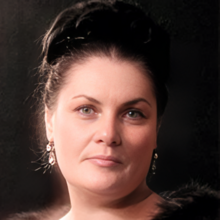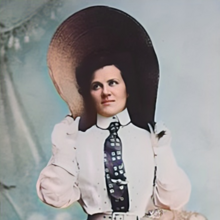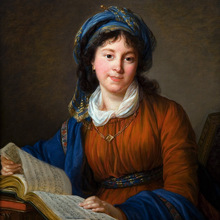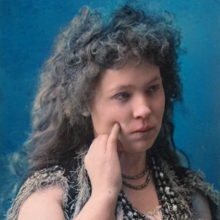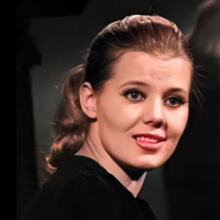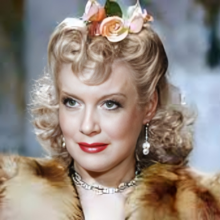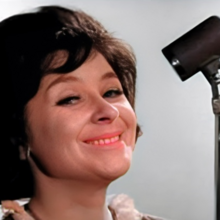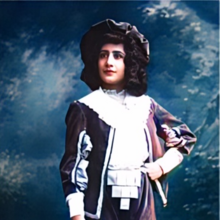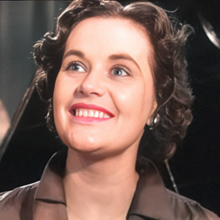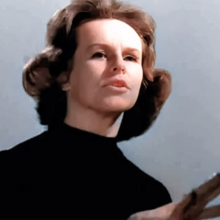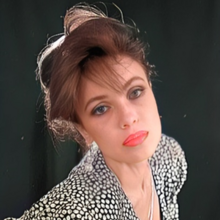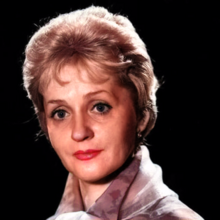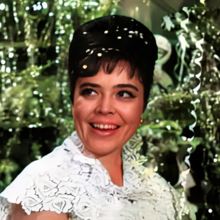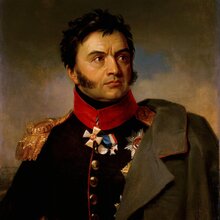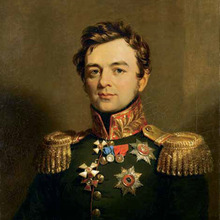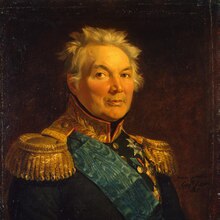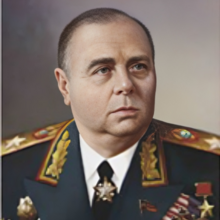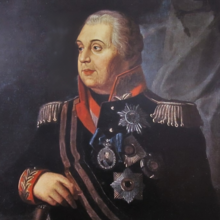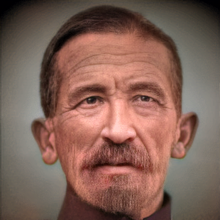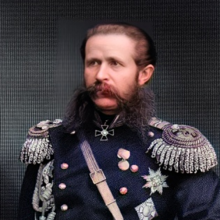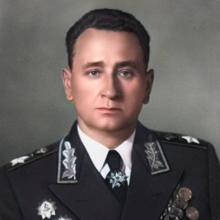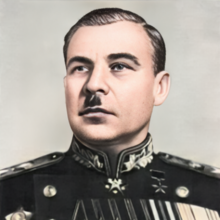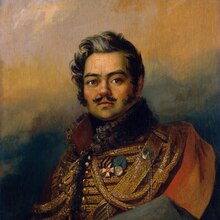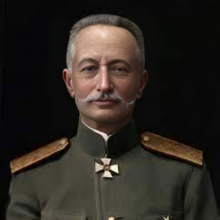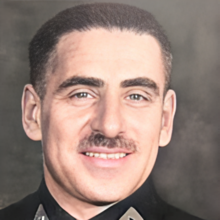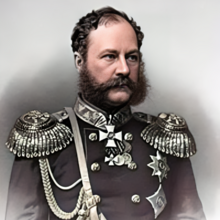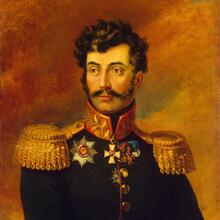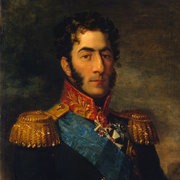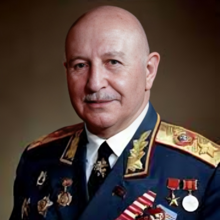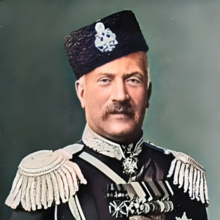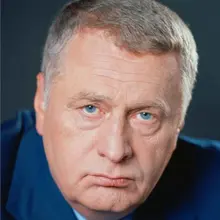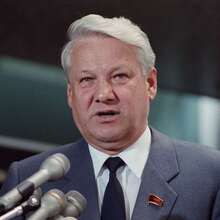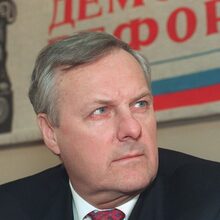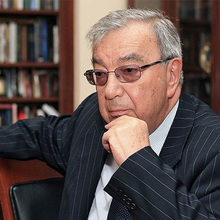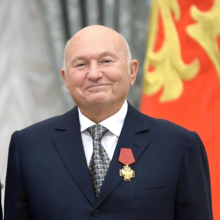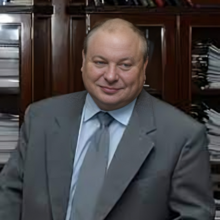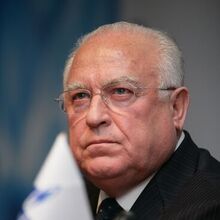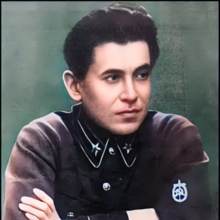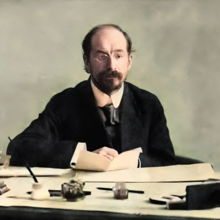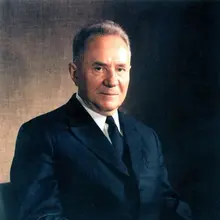 Evgenia Antipova
1917 - 2009
Painter
Evgenia Antipova
1917 - 2009
Painter
 Vsevolod Bazhenov
1909 - 1986
Painter
Vsevolod Bazhenov
1909 - 1986
Painter
 Maria Bashkirtseva
1858 - 1884
Portraits and cityscapes
Maria Bashkirtseva
1858 - 1884
Portraits and cityscapes
 Alexander Deyneka
1899 - 1969
Painter, graphic artist and sculptor
Alexander Deyneka
1899 - 1969
Painter, graphic artist and sculptor
 Aristarkh Lentulov
1882 - 1943
Painter and stage designer
Aristarkh Lentulov
1882 - 1943
Painter and stage designer
 Leonid Govorov
1897 - 1955
Soviet military commander
Leonid Govorov
1897 - 1955
Soviet military commander
 Alexandre Jacovleff
1887 - 1938
Painter of portraits and genre scenes
Alexandre Jacovleff
1887 - 1938
Painter of portraits and genre scenes
 Leonid Utesov
1895 - 1982
Estrada singer and comic actor
Leonid Utesov
1895 - 1982
Estrada singer and comic actor
 Arkady Kobyakov
1962 - 2002
Folk singer-songwriter
Arkady Kobyakov
1962 - 2002
Folk singer-songwriter
 Ivan Bagramyan
1897 - 1982
Builder of the Transcaspian Railway, explorer
Ivan Bagramyan
1897 - 1982
Builder of the Transcaspian Railway, explorer
 Rafail Levitsky
1847 - 1940
Painter and photographer
Rafail Levitsky
1847 - 1940
Painter and photographer
 Sergei Frolov
1924 - 1998
Painter and art teacher
Sergei Frolov
1924 - 1998
Painter and art teacher
 Isaac Levitan
1860 - 1900
Painter
Isaac Levitan
1860 - 1900
Painter
 Leonid Stein
1934 - 1973
Chess player
Leonid Stein
1934 - 1973
Chess player
 Elena Obraztsova
1939 - 2015
Soviet and Russian opera singer
Elena Obraztsova
1939 - 2015
Soviet and Russian opera singer
 Alexander Briullov
1798 - 1877
Art critic and historian
Alexander Briullov
1798 - 1877
Art critic and historian
 Vladimir Borovikovsky
1757 - 1825
Painting landscapes and seascapes
Vladimir Borovikovsky
1757 - 1825
Painting landscapes and seascapes
 Efim Geller
1925 - 1998
Chess player and coach
Efim Geller
1925 - 1998
Chess player and coach
 Nikolai Yezhov
1895 - 1940
Chief of the NKVD ,organizer of the Great Terror
Nikolai Yezhov
1895 - 1940
Chief of the NKVD ,organizer of the Great Terror
 Ivan Kramskoi
1837 - 1887
Painter and art critic
Ivan Kramskoi
1837 - 1887
Painter and art critic
 Mikhail Guzhavin
1888 - 1931
Painter and art teacher
Mikhail Guzhavin
1888 - 1931
Painter and art teacher
 Iosif Gurko
1828 - 1901
Field marshal during the Russo-Turkish War
Iosif Gurko
1828 - 1901
Field marshal during the Russo-Turkish War
 Alexei Kosygin
1904 - 1980
Premier of the Soviet Union
Alexei Kosygin
1904 - 1980
Premier of the Soviet Union
 Tamara Miansarova
1931 - 2017
Soviet pop and soprano singer
Tamara Miansarova
1931 - 2017
Soviet pop and soprano singer
 Sergey Nagovitsyn
1968 - 1999
Russian chanson singer-songwriter
Sergey Nagovitsyn
1968 - 1999
Russian chanson singer-songwriter
 Anatoly Lunacharsky
1875 - 1933
First Soviet People's Commissar of Education
Anatoly Lunacharsky
1875 - 1933
First Soviet People's Commissar of Education
 Gelena Velikanova
1923 - 1998
Estrada singer and comic actor
Gelena Velikanova
1923 - 1998
Estrada singer and comic actor
 Lech Kaczynski
1949 - 2010
President of Poland
Lech Kaczynski
1949 - 2010
President of Poland
 Vasily Demut Malinovsky
1779 - 1846
History and portrait sculptor
Vasily Demut Malinovsky
1779 - 1846
History and portrait sculptor
 Vasili Pukirev
1832 - 1890
Russian genre painter
Vasili Pukirev
1832 - 1890
Russian genre painter
 Nikolay Arutyunov
1958 - 2021
Blues and rock vocalist
Nikolay Arutyunov
1958 - 2021
Blues and rock vocalist
 Zinaida Serebriakova
1884 - 1967
Russian and French painter
Zinaida Serebriakova
1884 - 1967
Russian and French painter
 Mikhail Chapiro
1938 - 2019
Painting portraits
Mikhail Chapiro
1938 - 2019
Painting portraits
 Vladimir Mayakovsky
1893 - 1930
Russian Futurist poet and revolutionary
Vladimir Mayakovsky
1893 - 1930
Russian Futurist poet and revolutionary
 Mikhail Kutuzov
1745 - 1813
Field marshal who repelled Napoleon's invasion
Mikhail Kutuzov
1745 - 1813
Field marshal who repelled Napoleon's invasion
 Mikhail Larionov
1881 - 1964
Painter and stage designer
Mikhail Larionov
1881 - 1964
Painter and stage designer
 Nikolai Bulganin
1895 - 1975
Premier of the Soviet Union
Nikolai Bulganin
1895 - 1975
Premier of the Soviet Union
 Pavel Korin
1892 - 1967
Painter and art restorer
Pavel Korin
1892 - 1967
Painter and art restorer
 Ivan Bilibin
1876 - 1942
Illustrations of Russian fairy tales
Ivan Bilibin
1876 - 1942
Illustrations of Russian fairy tales
 Mikhail Annenkov
1835 - 1899
Builder of the Transcaspian Railway, explorer
Mikhail Annenkov
1835 - 1899
Builder of the Transcaspian Railway, explorer
 Tatyana Snezhina
1972 - 1995
Poet and singer-songwriter
Tatyana Snezhina
1972 - 1995
Poet and singer-songwriter
 Alexander Barykin
1952 - 2011
Folk singer-songwriter
Alexander Barykin
1952 - 2011
Folk singer-songwriter
 Nikolai Bukharin
1888 - 1938
Bolshevik leader and Marxist theorist
Nikolai Bukharin
1888 - 1938
Bolshevik leader and Marxist theorist
 Semyon Andreevich Pugachov
1740 - 1775
Leader of Pugachev's Rebellion against Catherine
Semyon Andreevich Pugachov
1740 - 1775
Leader of Pugachev's Rebellion against Catherine
 Mikhail Speransky
1754 - 1826
Envoy to the Holy Roman Empire
Mikhail Speransky
1754 - 1826
Envoy to the Holy Roman Empire
 Isaac Boleslavsky
1919 - 1977
Chess Grandmaster
Isaac Boleslavsky
1919 - 1977
Chess Grandmaster
 Zlata Razdolina
1954 - 2006
Author song singer-songwriter
Zlata Razdolina
1954 - 2006
Author song singer-songwriter
 Vasily Blucher
1889 - 1938
Military leader in the Great Patriotic War
Vasily Blucher
1889 - 1938
Military leader in the Great Patriotic War
 Yury Luzhkov
1936 - 2019
Mayor of Moscow
Yury Luzhkov
1936 - 2019
Mayor of Moscow
 El Lissitzky
1890 - 1941
Artist and designer
El Lissitzky
1890 - 1941
Artist and designer
 Stepan Pimenov
1784 - 1833
Sculptor of Russian classicism
Stepan Pimenov
1784 - 1833
Sculptor of Russian classicism
 Vitus Jonassen Bering
1681 - 1741
Explorer and navigator in Russian service
Vitus Jonassen Bering
1681 - 1741
Explorer and navigator in Russian service
 Alexei Savrasov
1830 - 1897
Russian genre painter
Alexei Savrasov
1830 - 1897
Russian genre painter
 Nazim Hikmet
1902 - 1963
Poet, playwright, novelist, screenwriter
Nazim Hikmet
1902 - 1963
Poet, playwright, novelist, screenwriter
 Mikhail Kalinin
1875 - 1946
Head of state of the Soviet Union
Mikhail Kalinin
1875 - 1946
Head of state of the Soviet Union
 Viktor Tsoi
1962 - 1990
Co-founder of the rock band Kino
Viktor Tsoi
1962 - 1990
Co-founder of the rock band Kino
 David Burliuk
1882 - 1967
Painter and poet
David Burliuk
1882 - 1967
Painter and poet
 Igor Svyatoslavich
1150 - 1202
Prince of Novgorod-Seversk and Chernigov
Igor Svyatoslavich
1150 - 1202
Prince of Novgorod-Seversk and Chernigov
 Konstantin Korovin
1861 - 1939
Painter of landscapes, portraits
Konstantin Korovin
1861 - 1939
Painter of landscapes, portraits
 Denis Davydov
1784 - 1839
Hussar poet and guerrilla leader
Denis Davydov
1784 - 1839
Hussar poet and guerrilla leader
 Vladimir Chekalov
1922 - 1992
Painter and art teacher
Vladimir Chekalov
1922 - 1992
Painter and art teacher
 Grigori Rasputin
1869 - 1916
Friend and adviser of Nicholas II
Grigori Rasputin
1869 - 1916
Friend and adviser of Nicholas II
 Nikolai Baskakov
1918 - 1993
Painter
Nikolai Baskakov
1918 - 1993
Painter
 Nikolai Bogdanov Belsky
1870 - 1960
Art critic and historian
Nikolai Bogdanov Belsky
1870 - 1960
Art critic and historian
 Vladimir Gorb
1903 - 1988
Painter and art teacher
Vladimir Gorb
1903 - 1988
Painter and art teacher
 Ivan Bogdanov
1855 - 1932
Illustrations of Russian fairy tales
Ivan Bogdanov
1855 - 1932
Illustrations of Russian fairy tales
 Georgy Lvov
1861 - 1925
Minister-Chairman
Georgy Lvov
1861 - 1925
Minister-Chairman
 Dmitry Levitzky
1735 - 1822
Painter and photographer
Dmitry Levitzky
1735 - 1822
Painter and photographer
 Aleksandra Ekster
1882 - 1949
Painter and designer
Aleksandra Ekster
1882 - 1949
Painter and designer
 Kazimir Malevich
1879 - 1935
Founder of Suprematism
Kazimir Malevich
1879 - 1935
Founder of Suprematism
 Yuri Shatunov
1964 - 2022
Founder of the rock band Sektor Gaza
Yuri Shatunov
1964 - 2022
Founder of the rock band Sektor Gaza
 Marc Chagall
1887 - 1985
Painting portraits
Marc Chagall
1887 - 1985
Painting portraits
 Alexei Eriomin
1927 - 2005
Painter and art teacher
Alexei Eriomin
1927 - 2005
Painter and art teacher
 Xian Xinghai
1905 - 1945
Composer of contemporary classical music
Xian Xinghai
1905 - 1945
Composer of contemporary classical music
 Yevgeny Petrov
1902 - 1942
Writer
Yevgeny Petrov
1902 - 1942
Writer
 Ilya Repin
1844 - 1930
Russian genre painter
Ilya Repin
1844 - 1930
Russian genre painter
 Alexander Sizonenko
1959 - 2012
Basketball player
Alexander Sizonenko
1959 - 2012
Basketball player
 Rudolf Frentz
1888 - 1956
Painter and art teacher
Rudolf Frentz
1888 - 1956
Painter and art teacher
 Stanislaw August Poniatowski
1732 - 1798
King of Poland and Grand Duke of Lithuania
Stanislaw August Poniatowski
1732 - 1798
King of Poland and Grand Duke of Lithuania
 Pyotr Bagration
1765 - 1812
Military leader in the Napoleonic Wars
Pyotr Bagration
1765 - 1812
Military leader in the Napoleonic Wars
 Ivan Shishkin
1832 - 1898
Russian landscape painter
Ivan Shishkin
1832 - 1898
Russian landscape painter
 Aleksei Gritsai
1914 - 1998
Painter and art teacher
Aleksei Gritsai
1914 - 1998
Painter and art teacher
 Dmitry Bogrov
1887 - 1911
Lawyer
Dmitry Bogrov
1887 - 1911
Lawyer
 Mikhail Vrubel
1856 - 1910
Symbolist painter and artist
Mikhail Vrubel
1856 - 1910
Symbolist painter and artist
 Viktor Hartmann
1834 - 1873
Painter of historical
Viktor Hartmann
1834 - 1873
Painter of historical
 Yevgeny Vuchetich
1908 - 1974
Soviet sculptor and artist
Yevgeny Vuchetich
1908 - 1974
Soviet sculptor and artist
 Lavr Kornilov
1870 - 1918
Field marshal during the Russo-Turkish War
Lavr Kornilov
1870 - 1918
Field marshal during the Russo-Turkish War
 Lyudmila Gurchenko
1935 - 2011
Pop singer and actress
Lyudmila Gurchenko
1935 - 2011
Pop singer and actress
 Peter Clodt
1805 - 1867
History and portrait sculptor
Peter Clodt
1805 - 1867
History and portrait sculptor
 Nadezhda Obukhova
1886 - 1961
Russian and Soviet opera singer
Nadezhda Obukhova
1886 - 1961
Russian and Soviet opera singer
 Alexander Gorchakov
1798 - 1883
Foreign minister of the Russian Empire
Alexander Gorchakov
1798 - 1883
Foreign minister of the Russian Empire
 Longin Frikke
1820 - 1893
Graphic artist, woodcut illustrator, art critic
Longin Frikke
1820 - 1893
Graphic artist, woodcut illustrator, art critic
 Yakov Malik
1906 - 1980
Diplomat
Yakov Malik
1906 - 1980
Diplomat
 Nikolay Rumyantsev
1754 - 1826
Envoy to the Holy Roman Empire
Nikolay Rumyantsev
1754 - 1826
Envoy to the Holy Roman Empire
 Kirill Meretskov
1897 - 1968
Field marshal during the Russo-Turkish War
Kirill Meretskov
1897 - 1968
Field marshal during the Russo-Turkish War
 Aleksandr Nikolayev
1897 - 1957
Painter and graphic artist
Aleksandr Nikolayev
1897 - 1957
Painter and graphic artist
 Maria Poiret
1863 - 1933
Soviet film star and singer
Maria Poiret
1863 - 1933
Soviet film star and singer
 Gavriil Gorelov
1880 - 1966
Painter and art teacher
Gavriil Gorelov
1880 - 1966
Painter and art teacher
 Feodor Bruni
1799 - 1875
Painting portraits
Feodor Bruni
1799 - 1875
Painting portraits
 Valery Jacobi
1834 - 1902
Painter of historical and genre scenes
Valery Jacobi
1834 - 1902
Painter of historical and genre scenes
 Lyubov Popova
1889 - 1924
Avant-garde artist and designer
Lyubov Popova
1889 - 1924
Avant-garde artist and designer
 Irina Gribulina
1953 - 2008
Folk singer-songwriter
Irina Gribulina
1953 - 2008
Folk singer-songwriter
 Adrian Volkov
1827 - 1873
Genre painter
Adrian Volkov
1827 - 1873
Genre painter
 Alexander Kerensky
1881 - 1970
Minister-Chairman
Alexander Kerensky
1881 - 1970
Minister-Chairman
 Konstantin Somov
1869 - 1939
Russian and French painter
Konstantin Somov
1869 - 1939
Russian and French painter
 Vladimir Zhirinovsky
1946 - 2022
Leader of the Liberal Democratic Party
Vladimir Zhirinovsky
1946 - 2022
Leader of the Liberal Democratic Party
 Leonid Pasternak
1862 - 1945
Painter, illustrator
Leonid Pasternak
1862 - 1945
Painter, illustrator
 Aleksei Brusilov
1853 - 1926
Military leader in the First World War
Aleksei Brusilov
1853 - 1926
Military leader in the First World War
 Valentin Serov
1874 - 1947
Avant-garde artist and explorer
Valentin Serov
1874 - 1947
Avant-garde artist and explorer
 Ivan Argunov
1753 - 1795
Cityscapes and landscapes
Ivan Argunov
1753 - 1795
Cityscapes and landscapes
 Nicolae Milescu
1636 - 1708
Scholar
Nicolae Milescu
1636 - 1708
Scholar
 Silvestr Shchedrin
1791 - 1830
Russian landscape painter
Silvestr Shchedrin
1791 - 1830
Russian landscape painter
 Alexey Venetsianov
1776 - 1857
Romantic painter
Alexey Venetsianov
1776 - 1857
Romantic painter
 Natalia Iretskaya
1843 - 1922
Soviet pop and soprano singer
Natalia Iretskaya
1843 - 1922
Soviet pop and soprano singer
 Natalia Kurakina
1766 - 1831
Soviet film star and singer
Natalia Kurakina
1766 - 1831
Soviet film star and singer
 Nikolai Chekhov
1858 - 1889
Painting portraits , illustrating Anton's stories
Nikolai Chekhov
1858 - 1889
Painting portraits , illustrating Anton's stories
 Apollinary Vasnetsov
1856 - 1933
Historical and landscape painter
Apollinary Vasnetsov
1856 - 1933
Historical and landscape painter
 Mikhail Mikeshin
1835 - 1896
Outdoor statues in the major cities
Mikhail Mikeshin
1835 - 1896
Outdoor statues in the major cities
 Jeanna Friske
1974 - 2015
Pop singer and actress
Jeanna Friske
1974 - 2015
Pop singer and actress
 Mikhail Nesterov
1862 - 1942
Religious and historical paintings
Mikhail Nesterov
1862 - 1942
Religious and historical paintings
 Konstantin Flavitsky
1830 - 1866
Painter of domestic genre scenes
Konstantin Flavitsky
1830 - 1866
Painter of domestic genre scenes
 Yanka Dyagileva
1966 - 1991
Underground punk musician
Yanka Dyagileva
1966 - 1991
Underground punk musician
 Pavel Filonov
1883 - 1941
Painter and art theorist
Pavel Filonov
1883 - 1941
Painter and art theorist
 Georgy Pyatakov
1890 - 1937
Bolshevik leader and Soviet administrator
Georgy Pyatakov
1890 - 1937
Bolshevik leader and Soviet administrator
 Irina Brzhevskaya
1929 - 2019
Pop singer and soprano
Irina Brzhevskaya
1929 - 2019
Pop singer and soprano
 Pavel Milyukov
1859 - 1943
Historian and foreign minister
Pavel Milyukov
1859 - 1943
Historian and foreign minister
 Boris Kustodiev
1878 - 1927
Painter and stage designer
Boris Kustodiev
1878 - 1927
Painter and stage designer
 Feodor Vasilyev
1850 - 1873
Realist painter
Feodor Vasilyev
1850 - 1873
Realist painter
 Aleksey Antropov
1716 - 1795
Cityscapes and landscapes
Aleksey Antropov
1716 - 1795
Cityscapes and landscapes
 Alexey Bogolyubov
1824 - 1896
Painting landscapes and seascapes
Alexey Bogolyubov
1824 - 1896
Painting landscapes and seascapes
 Ivan Khrutsky
1810 - 1885
Painter of still lifes and portraits
Ivan Khrutsky
1810 - 1885
Painter of still lifes and portraits
 Konstantin Makovsky
1839 - 1915
Realist painter
Konstantin Makovsky
1839 - 1915
Realist painter
 Rimma Kazakova
1932 - 2008
Estrada singer and comic actor
Rimma Kazakova
1932 - 2008
Estrada singer and comic actor
 Gennady Ladyzhensky
1852 - 1916
Landscape painter and academician
Gennady Ladyzhensky
1852 - 1916
Landscape painter and academician
 Konstantin Bogaevsky
1872 - 1943
Painter
Konstantin Bogaevsky
1872 - 1943
Painter
 Lyubov Orlova
1902 - 1975
Soviet film star and singer
Lyubov Orlova
1902 - 1975
Soviet film star and singer
 Alexander Opekushin
1838 - 1923
Painter and art theorist
Alexander Opekushin
1838 - 1923
Painter and art theorist
 Vasily Polenov
1844 - 1927
Founder of the school of Russian landscape
Vasily Polenov
1844 - 1927
Founder of the school of Russian landscape
 Kuzma Petrov Vodkin
1878 - 1939
Symbolist painter and writer
Kuzma Petrov Vodkin
1878 - 1939
Symbolist painter and writer
 Veniamin Borisov
1935 - 2014
Painter and art teacher
Veniamin Borisov
1935 - 2014
Painter and art teacher
 Amalie Konsa
1873 - 1949
Vanemuine theatre actress and singer
Amalie Konsa
1873 - 1949
Vanemuine theatre actress and singer
 Sergei Witte
1849 - 1915
Finance minister and prime minister of Russia
Sergei Witte
1849 - 1915
Finance minister and prime minister of Russia
 Feodor Tolstoy
1782 - 1846
Adventurer and duelist
Feodor Tolstoy
1782 - 1846
Adventurer and duelist
 Grigory Soroka
1823 - 1864
Painter, member of Venetsianov school
Grigory Soroka
1823 - 1864
Painter, member of Venetsianov school
 Boris Yeltsin
1931 - 2007
First president of the Russian Federation
Boris Yeltsin
1931 - 2007
First president of the Russian Federation
 Pavel Fedotov
1815 - 1852
Painter of domestic genre scenes
Pavel Fedotov
1815 - 1852
Painter of domestic genre scenes
 Evgraf Semenovich Sorokin
1821 - 1892
Historical, religious and genre painter
Evgraf Semenovich Sorokin
1821 - 1892
Historical, religious and genre painter
 Eugenios Voulgaris
1716 - 1806
Cleric, author, educator, mathematician
Eugenios Voulgaris
1716 - 1806
Cleric, author, educator, mathematician
 Klara Rumyanova
1929 - 2004
Voice actress and singer
Klara Rumyanova
1929 - 2004
Voice actress and singer
 Naum Gabo
1890 - 1977
Sculptor, theorist, and key figure
Naum Gabo
1890 - 1977
Sculptor, theorist, and key figure
We Need -- admin in


